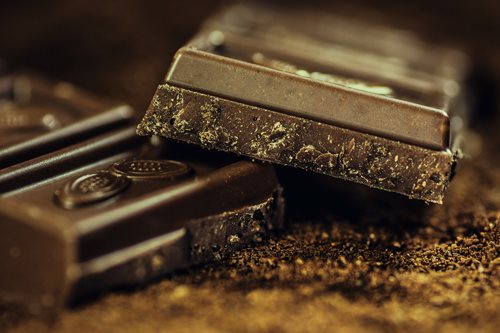
Good news. Eating dark chocolate has positive effects on stress levels, mood, memory, inflammation and your immunity. It’s also a yummy treat!
New research shows that consuming a small piece of dark chocolate, specifically “minimally 70% cacao” (and no more than) 30% organic cane sugar, supports your cognitive health, endocrine system and your cardiovascular health.. That’s a steep list of positive health benefits for such a decadent indulgence!
But hold on, don’t grab that milk chocolate bar or M&Ms! What makes dark chocolate (as opposed to milk chocolate) healthy is the amount of CACAO in the bar.
Most chocolate candy is made from COCOA. So what’s the difference between cacao and cocoa? From a nutrition standpoint, there’s a major difference. To be considered ‘”healthy” the chocolate needs to be made from at least 70% cacao.
Both cacao and cocoa come from the Cacao tree, which produces the pods and cacao beans. But cacao is made by cold-pressing unroasted cacao beans. This minimal processing preserve the nutritional benefits of the cacao bean, keeping the enzymes that deliver the nutritious benefits intact.
The process retains the living enzymes in the cacao, but removes the fat (cacao butter). To create cocoa, the cacao beans must be roasted at a high temperature. This high temperature causes the living enzymes of the bean to be destroyed and that simple molecular change is what lowers the nutritional value.
Health benefits of cacao:
A new study found that the higher the concentration of cacao, the more positive the impact it has on…
- Cognition
- Memory
- Mood
- Immunity
Benefits of dark chocolate (70% cacao or more)
- Reduces stress levels
- Improves mood and memory
- Lowers inflammation
- Supports health immune system and response.
- Improves cognitive health
- Improved the endocrine system and response
- Great source of both fiber and minerals: magnesium, iron, potassium, calcium, zinc, copper, and manganese.
- Good for your gut health: Gut health is tied to overall health. Inside your gut you have millions of beneficial bacteria that help you absorb and utilize the nutrition in your food. These are the “good” bacteria inside our digestive tracts. Dark chocolate is a great source of probiotics, which help good bacteria reproduce, thus keeping you healthy (immune function, brain and mood health, healthy weight).
- Supports a healthy response to UV exposure: Studies show that eating dark chocolate can help your skin in its elasticity and in its response to UV exposure.
- Helps to lowers insulin resistance: Insulin resistance happens when the muscle cells become unresponsive to insulin, a pre-curser to pre-diabetes and type 2 diabetes. Insulin resistance is also tied to memory and cognitive decline.
- High in antioxidants: Dark chocolate is rich in polyphenols, flavanols, and catechins. Cacao is high in an antioxidant called resveratrol (which is also found in red wine) that helps to protect your nervous system. Cacao has more antioxidants per 100g than blueberries, acai, or goji berries, and account for about 10% of the weight of raw cacao. Antioxidants can even help to prevent cancer.
How much dark chocolate should we eat?
- Don’t eat more than a single square (about 1 oz) of dark chocolate per day.
- Go premium! The darker the better, and no less than 70% cacao content.
- Avoid regular chocolate candies or anything made with refined flours or processed ingredients
- A heaping tablespoon of raw unprocessed Cacao powder is delightful in a cup of black coffee and packs a heap of health benefits for your body and mind. (Just leave out the sugar and cream! Instead, use a little stevia to sweeten, and choose unsweetened vanilla almond milk if you need a touch of lightness.)
Enjoy!